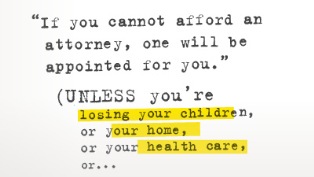Public Justice Center Program Launches Unprecedented Website
 Repository Contains All Data on Civil Right to Counsel Nationally
Repository Contains All Data on Civil Right to Counsel Nationally
Guest Blog by Jennifer Pelton, Director of Development, and John Nethercut, Executive Director, Public Justice Center, Member of Maryland Nonprofits
The National Coalition for a Civil Right to Counsel, a program co-founded and staffed by Maryland’s Public Justice Center, has just launched the most comprehensive resource in the civil right to counsel movement ever attempted. Appearing at www.civilrighttocounsel.org, the site’s principal feature is an interactive map that tracks the status of the right to counsel in civil cases in every
state,
The site also gathers data from every law review article, study, report, paper, news story, social media piece, and key case brief written about the civil right to counsel in the last five years. The result is a highly searchable bibliography that includes thousands of resources. The site also features a large library of audio and video related to
right
“Nothing of this scale has ever been built,” commented John Nethercut, Executive Director of the Public Justice Center. “It’s the only central repository in the country focused on information and data about the national civil right to counsel effort. There is no comparable resource.”
NCCRC focuses its efforts entirely on working to establish the right to counsel for low-income individuals in civil cases involving fundamental rights and basic human needs. Approximately 15 percent (46.5 million people) of the U.S. population lives in poverty. Few people
of
Having a lawyer can make the difference between keeping a home or losing it, obtaining protection from domestic violence or risking injury, having sufficient food or going hungry, even keeping a family together versus having it split apart.
The consequences of losing basic-need civil cases extend far beyond the immediate effects. When people lose their homes or
children,
and
Visit www.civilrighttocounsel.org for more information. And be sure to follow NCCRC on Facebook, Linkedin, and Twitter.
Connect with Maryland Nonprofits on Facebook, Twitter, LinkedIn, and Google+, tell us what you think and what kind of topics you would like to see more of on our blog.
![]() Fall into a rewarding nonprofit career, follow @MDNonprofitJobs
Fall into a rewarding nonprofit career, follow @MDNonprofitJobs
